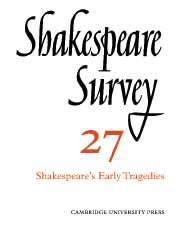Book contents
- Frontmatter
- Shakespeare’s Earliest Tragedies: ‘Titus Andronicus’ and ‘Romeo and Juliet’
- The Aesthetics of Mutilation in ‘Titus Andronicus’
- The Motif of Psychic Division in ‘Richard III’
- The Antic Disposition of Richard II
- The Prince of Denmark and Claudius’s Court
- ‘Hamlet’ and the ‘Moriae Encomium’
- The Relation of Henry V to Tamburlaine
- Shakespeare and the Puritan Dynamic
- Equity, ‘The Merchant of Venice’ and William Lambarde
- ‘Love’s Labour’s Won’ and the Occasion of ‘Much Ado’
- The Date and Production of ‘Timon’ Reconsidered
- Shakespeare, Her Majesty’s Players and Pembroke’s Men
- Judi dench talks to Gareth Lloyd Evans
- Shakespeare Straight and Crooked: A Review of the 1973 Season at Stratford
- The Year's Contributions to Shakespearian Study 1 Critical Studies
- 2 Shakespeare’s Life, Times, and Stage
- 3 Textual Studies
- Index
- Plate section
The Year's Contributions to Shakespearian Study 1 - Critical Studies
Published online by Cambridge University Press: 28 March 2007
- Frontmatter
- Shakespeare’s Earliest Tragedies: ‘Titus Andronicus’ and ‘Romeo and Juliet’
- The Aesthetics of Mutilation in ‘Titus Andronicus’
- The Motif of Psychic Division in ‘Richard III’
- The Antic Disposition of Richard II
- The Prince of Denmark and Claudius’s Court
- ‘Hamlet’ and the ‘Moriae Encomium’
- The Relation of Henry V to Tamburlaine
- Shakespeare and the Puritan Dynamic
- Equity, ‘The Merchant of Venice’ and William Lambarde
- ‘Love’s Labour’s Won’ and the Occasion of ‘Much Ado’
- The Date and Production of ‘Timon’ Reconsidered
- Shakespeare, Her Majesty’s Players and Pembroke’s Men
- Judi dench talks to Gareth Lloyd Evans
- Shakespeare Straight and Crooked: A Review of the 1973 Season at Stratford
- The Year's Contributions to Shakespearian Study 1 Critical Studies
- 2 Shakespeare’s Life, Times, and Stage
- 3 Textual Studies
- Index
- Plate section
Summary
Though the reach may exceed the grasp, an attempt to formulate the nature of Shakespearian tragedy is an ambitious enterprise. I. Morris and R. Nevo undertake it from very different points of view.
Morris sees Shakespearian tragedy in a religious perspective, although unlike most attempts to Christianise its meaning his argument does not depend on allegory or on explicit allusions to Christian doctrine within the plays. On the contrary, he insists upon the essentially secular nature of tragic experience, conceiving tragedy and Christian belief alike to be grounded upon the universal human condition in which worldly aspirations must inevitably end in failure and disaster, for 'in a Divine universe, every human aspiration short of the desire for God must come to naught'. 'The high duty of tragedy, in fact,' writes Morris, 'is to present the situation that faith must overcome.' It is the need for revelation, rather than the revelation itself, that he would have us recognise in the tragedies.
This argument, carefully stated and elaborately documented (though with relatively little direct reference to the plays themselves), seems open to question at several points. In stressing the basis of tragedy in human experience, for instance, Morris tends to obscure the distinction between life and art, and to overlook the fact that comedy has the same basis. Moreover, to describe tragedy as a 'confirmation', albeit implicit, of Christian truth contradicts the primacy and autonomy that are claimed for experience, and suggests instead that the eye of faith can only look upon tragedy as a mirror of its own preconceptions.
- Type
- Chapter
- Information
- Shakespeare Survey , pp. 155 - 172Publisher: Cambridge University PressPrint publication year: 1974

